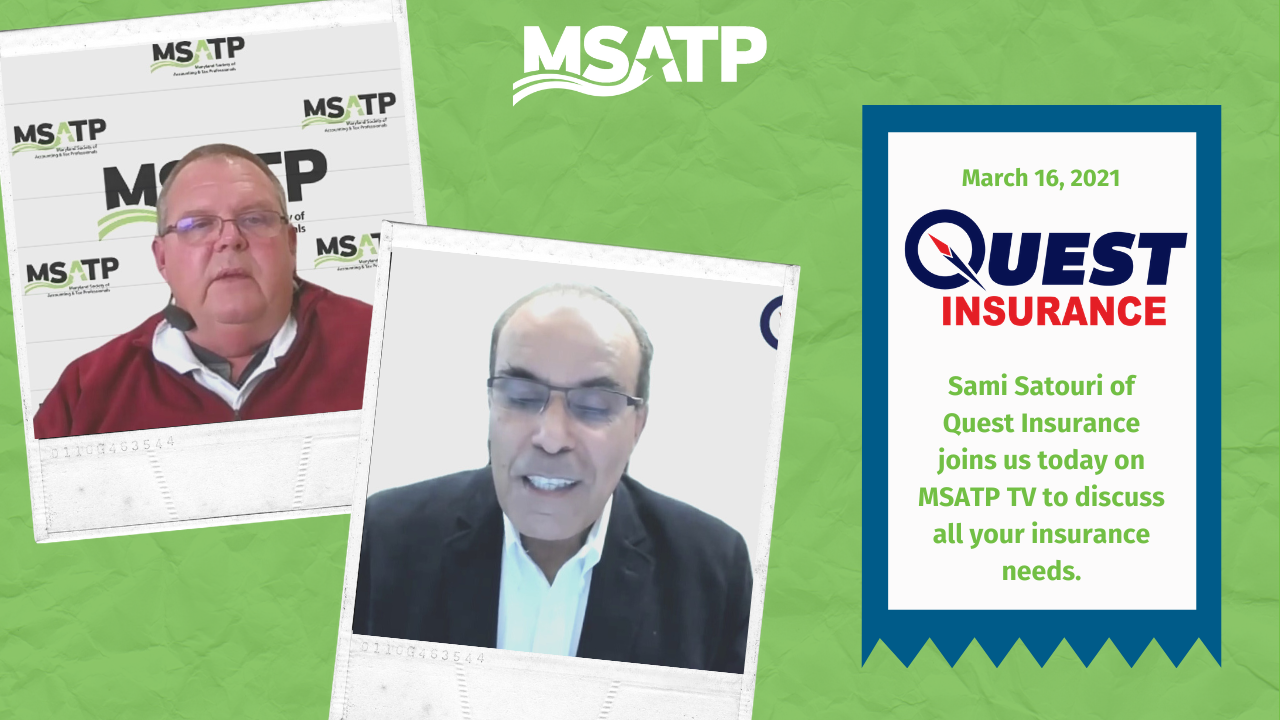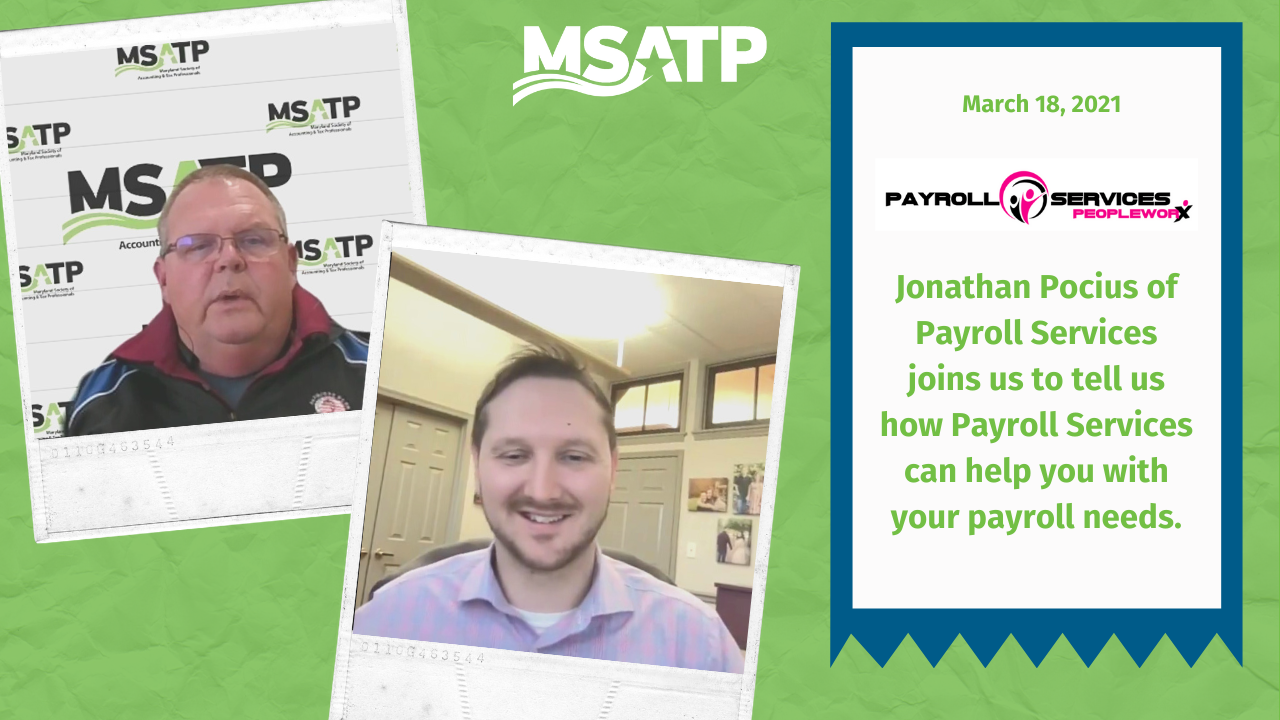

Executive Director Bill Feehley and Sami Satouri of Quest Insurance joins us on MSATP TV to discuss how Quest Insurance can handle all of your insurance needs.
Watch on YouTube.

Jonathan Pocius of Payroll Services joins Executive Director Bill Feehley to discuss how Payroll Services can provide a wide range of services including helping handle the Employee Retention Credit under the CARES Act.
Watch on YouTube.
IRS Office of Chief Counsel Unveils National Virtual Settlement Days Effort This Year to Reach More Tax Payers in More Parts of the Nation | IR-2021-61
The Internal Revenue Service Office of Chief Counsel has embarked on its most far-reaching Settlement Days program ever, declaring the month of March 2021 as “National Settlement Month.”
This ambitious program builds upon the success achieved from last year’s many settlement day events, when Chief Counsel shifted the program to a virtual format due to the pandemic. Virtual Settlement Day (VSD) events will be conducted by every Chief Counsel office across the country and will serve taxpayers in all 50 states and the District of Columbia.
“Virtual Settlement Day events enable the IRS to deliver meaningful resolution options to taxpayers as the nation works through the pandemic,” said IRS Commissioner Chuck Rettig. “Virtual options are an addition to traditional methods of communication and interaction with taxpayers that the IRS will always make available under normal circumstances.”
For more information, click here.
Possible PPP Extension Gives Groups Time to Push for Boosting These Type of Loans | Maryland Chamber of Commerce
On Tuesday, the House of Representatives voted to extend the Paycheck Protection Program (PPP) to May 31, instead of March 31, giving the Small Business Administration an additional 30 days to process loans. Support to move the PPP deadline has grown since the Biden administration announced last month changes to the program, including a 14-day priority application period for businesses with fewer than 20 employees, an updated loan calculation for sole proprietors and new eligibility rules.
In a March 11 letter to the House Small Business Committee, the National Federation of Independent Business also highlighted that Congress should allow businesses that applied earlier and received a smaller loan to reapply and get a larger amount under the new rules. The latest changes to the PPP were incredibly critical, especially for sole proprietors, but gave them less than a month to apply. Making those changes retroactive would provide critical relief to minority-owned businesses who only received a fraction of the relief they needed.
For more information, click here.
Important Information Regarding 2020 Virginia Income Tax Returns | Virginia’s Conformity to the Internal Revenue Code Advanced to December 31, 2020.
Under emergency legislation enacted by the 2021 General Assembly, Virginia’s date of conformity to the terms of the Internal Revenue Code advances from Dec. 31, 2019, to Dec. 31, 2020. This allows Virginia to generally conform to the Coronavirus Aid, Relief and Economic Security (CARES) Act and the Consolidated Appropriations Act (CAA).
However, it specifically deconforms from three provisions of the CARES Act that temporarily change limitations applicable to the net operating loss deduction, excess business losses and the business interest deduction. This legislation also deconforms from the provision of the CAA that permanently reduces the medical expense deduction threshold.
For more information. click here.
Revenue Ruling 2021-07 | RR-2021-07
Revenue Ruling 2021-07 provides various prescribed rates for federal income tax purposes including the applicable federal interest rates, the adjusted applicable federal interest rates, the adjusted federal long-term rate, and the adjusted federal long-term tax-exempt rate. These rates are determined as prescribed by § 1274.
The rates are published monthly for purposes of sections 42, 382, 412, 642, 1288, 1274, 7520, 7872, and various other sections of the Internal Revenue Code.
For more information, click here.
Tax Day For Individuals Extended to May 17: Treasury, IRS Extend Filing & Payment Deadline | IR-2021-59
The Treasury Department and IRS announced that the federal income tax filing due date for individuals for the 2020 tax year will be automatically extended from April 15, 2021, to May 17, 2021. The IRS will be providing formal guidance in the coming days.
Individual taxpayers can also postpone federal income tax payments for the 2020 tax year due on April 15, 2021, to May 17, 2021, without penalties and interest, regardless of the amount owed. This postponement applies to individual taxpayers, including individuals who pay self-employment tax. Penalties, interest and additions to tax will begin to accrue on any remaining unpaid balances as of May 17, 2021. Individual taxpayers will automatically avoid interest and penalties on the taxes paid by May 17.
Individual taxpayers do not need to file any forms or call the IRS to qualify for this automatic federal tax filing and payment relief. Individual taxpayers who need additional time to file beyond the May 17 deadline can request a filing extension until Oct. 15 by filing Form 4868 through their tax professional, tax software or using the Free File link on IRS.gov. Filing Form 4868 gives taxpayers until Oct. 15 to file their 2020 tax return but does not grant an extension of time to pay taxes due. Taxpayers should pay their federal income tax due by May 17, 2021, to avoid interest and penalties.
The IRS urges taxpayers who are due a refund to file as soon as possible. Most tax refunds associated with e-filed returns are issued within 21 days.
This relief does not apply to estimated tax payments that are due on April 15, 2021. These payments are still due on April 15. Taxes must be paid as taxpayers earn or receive income during the year, either through withholding or estimated tax payments. In general, estimated tax payments are made quarterly to the IRS by people whose income isn’t subject to income tax withholding, including self-employment income, interest, dividends, alimony or rental income. Most taxpayers automatically have their taxes withheld from their paychecks and submitted to the IRS by their employer.
For more information, click here.
Get Help with Filing Season and Economic Impact Payments
Whether you’re busy preparing 2020 tax returns, helping your customers get their Economic Impact Payments or are a valued partner that can help spread the word on these topics in your community, IRS has resources to help you.
Check Outreach Connection to get information and products tailored to the individuals, businesses and tax-exempt entities you serve.
IRS Expands Help to Taxpayers in Multiple Languages with New Forms, Communication Preferences | IR-2021-56
The Internal Revenue Service today said that it continues its efforts to expand ways to communicate to taxpayers who prefer to get information in other languages. For the first time ever, the agency has posted to IRS.gov a Spanish language version of Form 1040 and the related instructions.
“Being able to talk to and receive information from the nation’s tax agency in their preferred language is something we hope to eventually provide to all taxpayers,” said IRS Commissioner Chuck Rettig. “We want everyone to be on the same playing field, so to speak, and each day that we can move forward with that goal is a good one.”
The new Form 1040 Schedule LEP, in English and Spanish, with instructions available in English and 20 other languages, can be filed with a tax return by those taxpayers who prefer to communicate with the IRS in another language. They can indicate their language of preference for IRS-issued written communications or change their language of preference. While communications may not be immediately sent in the selected language, the IRS will use this information to allocate resources and develop communication alternatives based on the reported language preferences.
For more information, click here.
Tax Time Guide: IRS Reminds Taxpayers of Recent Changes to Retirement Plans | IR-2021-57
The Internal Revenue Service today reminded taxpayers about the rules for required minimum distributions (RMDs) from retirement accounts.
A retirement plan account owner must normally begin taking an RMD annually starting the year he or she reaches 70 ½ or 72, depending on their birthdate and maybe the year they retire. Retirement plans requiring RMDs include traditional, Simplified Employee Pension Plan (SEP) and Savings Incentive Match Plan for Employees (SIMPLE) Individual Retirement Accounts; 401(k), 403(b), 457(b), profit sharing and other defined contribution plans.
The Setting Every Community Up for Retirement Enhancement (SECURE) Act changed the age when individuals must begin taking withdrawals from their retirement accounts. Someone born on or before June 30, 1949, was required to start getting RMDs for the year they reached the age of 70½. However, under the SECURE Act, if a person’s 70th birthday is July 1, 2019, or later, they do not have to take their first RMD until the year they reach age 72.
For more information, click here.
HB 0148 – Commercial Law | Personal Information Protection Act
HB 0148 has passed the House and waiting for a Hearing date in the Senate Finance Committee. The new requirements have been underlined.
The bill requires a business that maintains (in addition to a business that owns or licenses) personal information of a Maryland resident to implement and maintain reasonable security procedures and practices that are appropriate to the nature of the personal information maintained and the nature and size of the business and its operations.
For a business that maintains personal data, generally, the business must notify the owner or licensee of the breach as soon as practicable; however, the bill requires the notification to be provided within 10 days (rather than 45 days) after the business discovers (or is notified) of the breach.
If a required notification is delayed because a law enforcement agency determines that the notification will impede a criminal investigate or jeopardize homeland or national security, notification must be given as soon as reasonably practicable, but no later than 7 days (rather than 30 days) after the law enforcement agency makes the required determination.
Read more on our blog.
